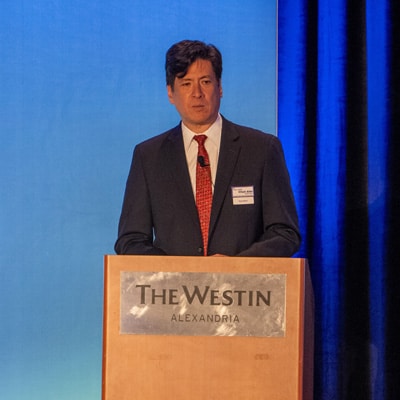A record 160 people packed the ballroom for the 2024 PPAI Product Responsibility Summit starting Monday morning.
Kristy Grant-Hart, founder and CEO of Spark Compliance, opened with a keynote address that emphasized the importance of a values-driven culture. She told attendees that values-driven organizations have higher employee engagement and better bottom-line results because people are engaged and proud of what they’re doing.
“We want to make our companies places that we’re proud of,” said Grant-Hart, “It’s worth investing in, because there’s actual ROI from all of this.”
She also encouraged the compliance professionals in the audience to develop resilience and remember that what they’re doing matters, because compliance can be a lonely road.
“When you feel lonely in your job and that nobody cares, recognize you are part of a global movement that is changing the world and how business is done,” she said.
Measuring Carbon Emissions
Mike Smith, founder and CEO of Aclymate (PPAI 833794, Standard-Base) spoke about measuring greenhouse gases and carbon reduction strategies from a risk management perspective. He encouraged cooperation and collaboration to tackle the challenges of emissions reporting, especially Scope 3, which he described as “the big, hairy gorilla” because it’s so broad.
“Scopes are about relationships,” he said. “Leverage those relationships to help you achieve some of your goals.”
Mitigating PFAS Risk in Promo
Chase Dressman, partner at the Taft Stettinus & Hollister law firm gave an update on PFAS regulation and litigation. He said the last few years have been “a tornado of activity from a litigation standpoint” and that PFAS chemicals are increasingly subject to regulation and litigation worldwide.
“There is a lot of activity at the federal level, but with PFAS, what we’re finding is that states are really steering the ship,” Dressman said. “They’re going to move the needle across the county. It’s no different from Prop 65.”
He emphasized the importance of understanding these laws and urged attendees to pay close attention to higher-risk products like stain- and water-resistant apparel or children’s products.
“Be aware of what’s in your product to the extent you can,” he said.
A Visit From The CPSC Chair
The audience was especially excited to welcome Alexander Hoehn-Saric, chair of the U.S. Consumer Product Safety Commission. Hoehn-Saric expressed appreciation for the industry’s attention to product safety and expressed a desire to collaborate with the industry, especially when to comes to tracking problematic products.
“Direct notice is the most effective tool to get consumers to take action,” he said, adding, “I would love to get your thoughts on how we can be more effective in reaching people.”

The chair also reported that the CPSC is taking major steps to implement its e-filing program for imports to support faster processing and emphasize focus on higher-risk products.
“In the end, we’re all working together toward the same goal,” he said.
Rick Brenner, president of Product Safety Advisors (PPAI 668098, Standard-Base), asked questions submitted by attendees on topics ranging from the e-filing timeline to PFAS, lithium-ion batteries and voluntary standards and more.
Collaborating For More Sustainable Product Supply Chains
Kevin Myette, director of global brand services for bluesign technologies (PPAI 825888, Standard-Base), encouraged attendees to dig deep into their supply chains, which he said are far more complex than most people realize, driving home the point with a complicated diagram.
“Develop a collaborative environment,” he advised, “and you need to involve the entire supply chain in doing that. We’re all learning in this space, and you can learn from each other. There’s no way that any one organization is going to solve these problems by themselves. There’s plenty of things we compete on, but way more we can work on together.”
Myette and Doug Jackson, president and founder of Storm Creek (PPAI 438091, Gold) – the No. 43 supplier in the PPAI 100 – discussed how using recycled fibers is only the beginning when it comes to making sustainable apparel. “If you do recycling and that’s all you’re doing, you’re missing the boat, because that’s not where the biggest impact can be,” Myette said.
“The fabric suppliers are the key,” added Jackson. “Doing recycled alone is not enough. You also have to control the chemicals.”
Seeking Transparency
Many of the speakers emphazised the importance of asking questions and being aware of challenges throughout the supply chain.
“Think about the products that you’re sourcing – are those higher risk for child labor?” said Kelly Hoggle, amfori (PPAI 834026, Standard-Base) network representative for the U.S. and Canada. “The first step is to know your risk, and there’s a lot of good tools out there to help you do that.” She recommended CSR Risk Check, an online tool where users can enter a product and the source country to get a free report.
Koen Warmerdam, co-founder and brand director of Aware (PPAI 835662, Standard-Base) shared how a digital product passport helps a company “move from speculation to verification” and prove the claims its makes about its products by sharing reliable data.
Tim Behling, vice president of supply chain and sustainability at Gemline (PPAI 113948, Platinum) – the No. 11 supplier in the PPAI 100 – described how brand partner MiiR wanted to “do something unique” and asked for traceability. “We were able to add value to that project,” he said. “It was a big lift at the beginning … but it was worthwhile. We were getting a benefit from seeing deeper into our supply chain.”
Those benefits include real-time data collection, material and compliance verification, tracing the product journey, and boosting sales. Most importantly, Behling said, data enables the company to better collaborate with partners and educate stakeholders and customers.
“We’re trying to really add that transparency so you as customers can feel good about it,” he added.
Industry-Specific Sustainability Benchmarking
The first day’s final session explored a new partnership between PPAI and Green Business Benchmark (PPAI 832454, Standard-Base), to sustain offer members discounted access to sustainability management, benchmarking and well-respected certifications. PPAI and GBB collaborated to create a promo-specific initiative with key elements for both suppliers and distributors.
“We’re really trying to make this as easy as possible, because for a lot of folks in this industry, sustainability is only part of their job, not their whole job,” said Elizabeth Wimbush, PPAI’s director of sustainability and responsibility.
Mary Crosetto, operations manager at Oregon-based distributor 1338tryon (PPAI 649357, Silver) was especially excited about the opportunity. “I called my boss and said, “We’re doing this!’” she said.
“Sustainability is very important at this conference, because every single claim made about recycled content or responsible sourcing or fair labor practices must be verified through testing, inspection or audit, just like in product safety,” said Lindsey Davis, MAS, PPAI’s director of sales and professional development. “Our research shows growing interest in sustainable promotional products, so the importance of validating these claims is more important than ever, both to the companies making the claim and also to the reputation of the promo industry as a whole.”
PPAI made a donation of $3,450 to the Sierra Club on behalf of early-bird registrants, and the conference is carbon neutral thanks to sponsor 4imprint, the No. 1 distributor in the PPAI 100.


